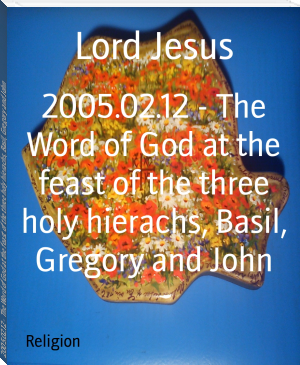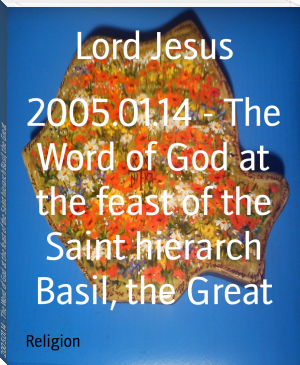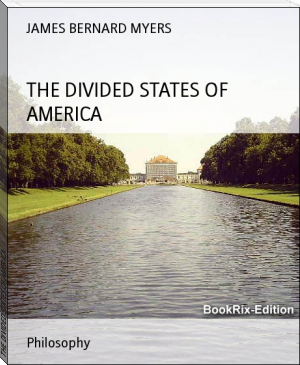The Book of Missionary Heroes by Basil Mathews (young adult books to read .txt) 📕

- Author: Basil Mathews
- Performer: -
Book online «The Book of Missionary Heroes by Basil Mathews (young adult books to read .txt) 📕». Author Basil Mathews
The world is the stadium. Teams of evil run rapidly and teams of good too.
The great heroes and heroines whose story is told in this book have run across the centuries over the world to us. Some of them are alive to-day, as heroic as those who have gone. But all of them say the same thing to us of the new world who are coming after them:
The greatest of them all, when he came to the very end of his days, as he fell and passed on the Torch to others, said:
But to us who are coming on as Torch-bearers after him he spoke in urgent words—written to the people at Corinth where the Isthmian races were run:
in a race all run, but one wins the prize?
So run, that ye may be victors."
[1] See "The Argonauts of Faith" by Basil Mathews. (Doran.)
Book One: THE PIONEERS CHAPTER I THE HERO OF THE LONG TRAIL St. Paul(Dates, b. A.D. 6, d. A.D. 67[2])
The Three Comrades.
The purple shadows of three men moved ahead of them on the tawny stones of the Roman road on the high plateau of Asia Minor one bright, fresh morning.[3] They had just come out under the arched gateway through the thick walls of the Roman city of Antioch-in-Pisidia. The great aqueduct of stone that brought the water to the city from the mountains on their right[4] looked like a string of giant camels turned to stone.
Of the three men, one was little more than a boy. He had the oval face of his Greek father and the glossy dark hair of his Jewish mother. The older men, whose long tunics were caught up under their girdles to give their legs free play in walking, were brown, grizzled, sturdy travellers. They had walked a hundred leagues together from the hot plains of Syria, through the snow-swept passes of the Taurus mountains, and over the sun-scorched levels of the high plateau.[5] Their muscles were as tireless as whipcord. Their courage had not quailed before robber or blizzard, the night yells of the hyena or the stones of angry mobs.
For the youth this was his first adventure out into the glorious, unknown world. He was on the open road with the glow of the sun on his cheek and the sting of the breeze in his face; a strong staff in his hand; with his wallet stuffed with food—cheese, olives, and some flat slabs of bread; and by his side his own great hero, Paul. Their sandals rang on the stone pavement of the road which ran straight as a strung bowline from the city, Antioch-in-Pisidia, away to the west. The boy carried over his shoulder the cloak of Paul, and carried that cloak as though it had been the royal purple garment of the Roman Emperor himself instead of the worn, faded, travel-stained cloak of a wandering tent-maker.
The two older men, whose names were Paul the Tarsian and Silas, had trudged six hundred miles. Their younger companion, whose name was "Fear God," or Timothy as we say, with his Greek fondness for perfect athletic fitness of the body, proudly felt the taut, wiry muscles working under his skin.
On they walked for day after day, from dawn when the sun rose behind them to the hour when the sun glowed over the hills in their faces. They turned northwest and at last dropped down from the highlands of this plateau of Asia Minor, through a long broad valley, until they looked down across the Plain of Troy to the bluest sea in the world.
Timothy's eyes opened with astonishment as he looked down on such a city as he had never seen—the great Roman seaport of Troy. The marble Stadium, where the chariots raced and the gladiators fought, gleamed in the afternoon light.
The three companions could not stop long to gaze. They swung easily down the hill-sides and across the plain into Troy, where they took lodgings.
They had not been in Troy long when they met a doctor named Luke. We do not know whether one of them was ill and the doctor helped him; we do not know whether Doctor Luke (who was a Greek) worshipped, when he met them, Æsculapius, the god of healing of the Greek people. The doctor did not live in Troy, but was himself a visitor.
"I live across the sea," Luke told his three friends—Paul, Silas and Timothy—stretching his hand out towards the north. "I live," he would say proudly, "in the greatest city of all Macedonia—Philippi. It is called after the great ruler Philip of Macedonia."
Then Paul in his turn would be sure to tell Doctor Luke what it was that had brought him across a thousand miles of plain and mountain pass, hill and valley, to Troy. This is how he would tell the story in such words as he used again and again:
"I used to think," he said, "that I ought to do many things to oppose the name of Jesus of Nazareth. I had many of His disciples put into prison and even voted for their being put to death. I became so exceedingly mad against them that I even pursued them to foreign cities.
"Then as I was journeying[6] to Damascus, with the authority of the chief priests themselves, at mid-day I saw on the way a light from the sky, brighter than the blaze of the sun, shining round about me and my companions. And, as we were all fallen on to the road, I heard a voice saying to me:
"'Saul, Saul, why do you persecute me? It is hard for you to kick against the goad.'
"And I said, 'Who are you, Lord?'
"The answer came: 'I am Jesus, whom you persecute.'"
Then Paul went on:
"I was not disobedient to the heavenly vision; but I told those in Damascus and in Jerusalem and in all Judæa, aye! and the foreign nations also, that they should repent and turn to God.
"Later on," said Paul, "I fell into a trance, and Jesus came again to me and said, 'Go, I will send you afar to the Nations.' That (Paul would say to Luke) is why I walk among perils in the city; in perils in the wilderness; in perils in the sea; in labour and work; in hunger and thirst and cold, to tell people everywhere of the love of God shown in Jesus Christ."[7]
The Call to Cross the Sea.
One night, after one of these talks, as Paul was asleep in Troy, he seemed to see a figure standing by him. Surely it was the dream-figure of Luke, the doctor from Macedonia, holding out his hands and pleading with Paul, saying, "Come over into Macedonia and help us."
Now neither Paul nor Silas nor Timothy had ever been across the sea into the land that we now call Europe. But in the morning, when Paul told his companions about the dream that he had had, they all agreed that God had called them to go and deliver the good news of the Kingdom to the people in Luke's city of Philippi and in the other cities of Macedonia.
So they went down into the busy harbour of Troy, where the singing sailor-men were bumping bales of goods from the backs of camels into the holds of the ships, and they took a passage in a little coasting ship. She hove anchor and was rowed out through the entrance between the ends of the granite piers of the harbour. The seamen hoisting the sails, the little ship went gaily out into the Ægean Sea.
All day they ran before the breeze and at night anchored under the lee of an island. At dawn they sailed northward again with a good wind, till they saw land. Behind the coast on high ground the columns of a temple glowed in the sunlight. They ran into a spacious bay and anchored in the harbour of a new city—Neapolis as it was called—the port of Philippi.
Landing from the little ship, Paul, Silas, Timothy and Luke climbed from the harbour by a glen to the crest of the hill, and then on, for three or four hours of hard walking, till their sandals rang on the pavement under the marble arch of the gate through the wall of Philippi.
Flogging and Prison.
As Paul and his friends walked about in the city they talked with people; for instance, with a woman called Lydia, who also had come across the sea from Asia Minor where she was born. She and her children and slaves all became Christians. So the men and women of Philippi soon began to talk about these strange teachers from the East. One day Paul and Silas met a slave girl dressed in a flowing, coloured tunic. She was a fortune-teller, who earned money for her masters by looking at people and trying to see at a glance what they were like so that she might tell their fortunes. The fortune-telling girl saw Paul and Silas going along, and she stopped and called out loud so that everyone who went by might hear: "These men are the slaves of the Most High God. They tell you the way of Salvation."
The people stood and gaped with astonishment, and still the girl called out the same thing, until a crowd began to come round. Then Paul turned round and with sternness in his voice spoke to the evil spirit in the girl and said: "In the Name of Jesus Christ, I order you out of her."
From that day the girl lost her power to tell people's fortunes, so that the money that used to come to her masters stopped flowing. They were very angry and stirred up everybody to attack Paul and Silas. A mob collected and searched through the streets until they found them. Then they clutched hold of their arms and robes, shouting: "To the prætors! To the prætors!" The prætors were great officials who sat in marble chairs in the Forum, the central square of the city.
The masters of the slave girl dragged Paul and Silas along. At their heels came the shouting mob and when they came in front of the prætors, the men cried out:
"See these fellows! Jews as they are, they are upsetting everything in the city. They tell people to take up customs that are against the Law for us as Romans to accept."
"Yes! Yes!" yelled the crowd. "Flog them! Flog them!"
The prætors, without asking Paul or Silas a single question as to whether this was true, or allowing them to make any defence, were fussily eager to show their Roman patriotism. Standing up they gave their orders:
"Strip them, flog them."
The slaves of the prætors seized Paul and Silas and took their robes from their backs. They were tied by their hands to the whipping-post. The crowd gathered round to see the foreigners thrashed.
The lictors—that is the soldier-servants of the prætors—untied their bundles of rods. Then each lictor brought down his rod with cruel strokes on Paul and Silas. The rods cut into the flesh and the blood flowed down.
Then their robes were thrown over their shoulders, and the two men, with their tortured backs bleeding, were led into the black darkness of the cell of the city prison; shackles were snapped on to their arms, and their feet were





Comments (0)